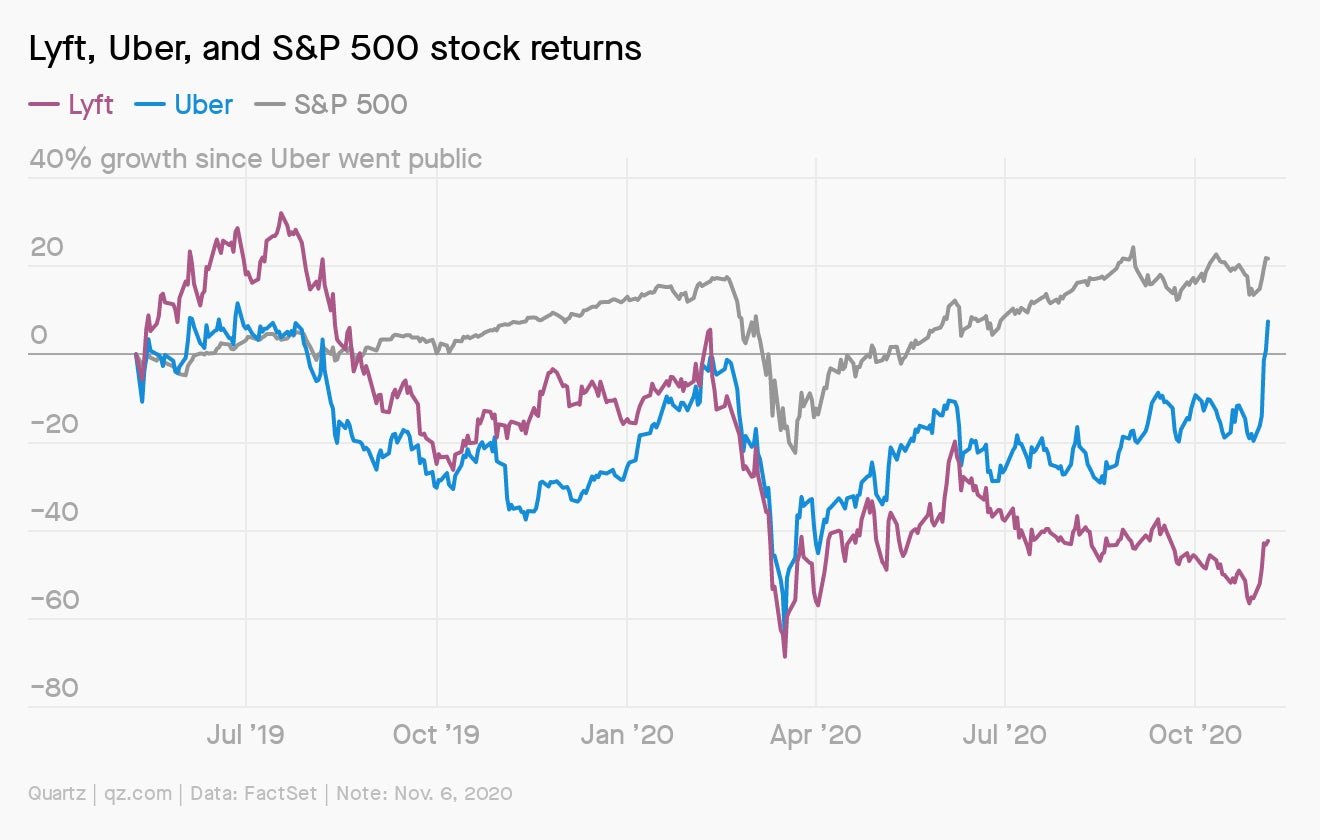A tricky Trump transition, Uber’s record market cap, the right to stay swole
Good morning, Quartz readers!

Good morning, Quartz readers!
Here’s what you need to know
🇺🇸 What to expect when you’re expecting a first term. Democratic challenger Joe Biden defeated incumbent Donald Trump in a fiercely contested US presidential election, a victory that stands to usher in a wave of policy rollbacks and reversals.
🤝 This presidential transition is particularly dangerous. Don’t hold your breath for a Trump-Biden photo op. In the midst of the pandemic, the Trump administration is delaying steps that ensure the business of the US government continues uninterrupted.
🌎 Biden’s big priority: planet Earth. The US president-elect will push for a 180-degree pivot on climate change, and the world is lining up to work with him.
🇮🇳 What the US results mean for India. Biden and vice president-elect Kamala Harris—whose mother immigrated to the US from India at age 19—may look to maintain the friendly relationship celebrated by Trump and prime minister Narendra Modi.
What else you need to know
- New Delhi is struggling with a surge of Covid-19 cases. India’s tally of confirmed cases is above 8.5 million, the second largest in the world behind the US.
- Myanmar voted in its second democratic election. Despite accusations of genocide, Aung San Suu Kyi’s party is expected to win a second term.
- Pro-democracy protesters rallied in Bangkok. On Sunday, police fired water cannons at protesters carrying letters to the Thai king urging a purge of the military from politics.
- Turkey ousted its central bank governor. President Recep Tayyip Erdogan fired Murat Uysal for the second time in a little over a year, after the lira fell to a record low.
- Category is: TV legends. Alex Trebek, the iconic host of US quiz show Jeopardy, died at 80 after a battle with pancreatic cancer. Trebek had hosted Jeopardy since 1984.
What to watch for
Monday: In a big day for long meetings, the World Health Assembly kicks off a weeklong virtual summit, Brexit negotiations continue, and Libya’s warring factions sit down in Tunisia. Earnings from Softbank, Beyond Meat, and McDonald’s.
Tuesday: Gadget geeks rejoice as Apple unveils the first Macs built with its proprietary chips and a new generation of Xbox goes on sale. China updates its consumer price index (CPI) for October. The US Supreme Court hears a case challenging the Affordable Care Act.
Wednesday: Chinese chipmaker SMIC and tech conglomerate Tencent release earnings.
Thursday: The US releases weekly jobless numbers and updates its CPI, and the UK publishes September GDP numbers. The new PlayStation goes on sale. Plus: earnings from Disney and Palantir.
Friday: The euro zone updates its GDP estimate for the quarter ended in September.
Charting Uber’s market cap
On Nov. 3, voters in California agreed to exempt gig companies from a new state labor law that would have upended Uber’s business model. By Nov. 6, the company’s market capitalization had reached $78 billion, an all-time high, surpassing Uber’s $75 billion valuation when it went public in May 2019.
The rebound is a validation of Uber’s decision to go public—even though it posted a loss of $1.09 billion last quarter—but Prop 22 could also set a precedent for how lawmakers approach worker classification. On a call with investors, Uber CEO Dara Khosrowshahi said that “going forward, you’ll see us more loudly advocate for new laws like Prop 22… It’s a priority for us to work with governments across the US and the world to make this a reality.”

Pop quiz
Which of these is not a Robert Ludlum novel?
- The Bourne Supremacy
- The Prometheus Deception
- The Ambler Warning
- The Momentus Prospectus
- The Sigma Protocol
Answer: (4) Momentus Space was founded in 2017 to develop a “last-mile” transportation system for satellites launched into orbit. The company is expected to go public on the NASDAQ in early 2021 through a special-purpose acquisition company (SPAC), and has filed a prospectus detailing its business model and risk factors. Just one hiccup: Momentus’s Russian founder, Mikhail Kokorich, is not allowed to work with his own company’s technology because of US rules intended to keep advanced space tech away from geopolitical rivals.
Silicon Valley saviors?

Fifteen years ago, climate tech was booming. Then it all cratered. Venture capitalists plowed $25 billion into the clean tech sector and saw more than half of it vanish—by 2011, the sector was in shambles.
How times change. Last year, 60% of VC money went into climate tech, motivated by the same thing that always motivates Silicon Valley: faith in a huge market. But what part does Silicon Valley play in the global energy transition? One answer: deep-pocketed customer. You can learn more about Silicon Valley’s role in mitigating climate change with our latest field guide on climate tech’s second shot.
Surprising discoveries
South Korea’s “sparrows” battle throwaway plastic. A volunteer army has collected and repurposed more than 85,000 bottle caps as plastic waste rises during the pandemic.
Cargo shipments of botox and cheese are saving airlines. Perishable freight has replaced human travelers onboard passenger jets.
British lunks are fighting for “gym rights.” As the UK enters another lockdown, a muscular activist bloc is pushing for exercise facilities to stay open.
Doomscrolling has a happy cousin. Depending on your politics, you may have been “gleefreshing” your social media feeds for election updates this weekend.
A resilient Daikon radish has become a 2020 role model. The leafy root vegetable is growing out of the concrete next to a busy pedestrian walkway in the heart of Osaka.
Our best wishes for a productive day. Please send any news, comments, Robert Ludlum title suggestions, and resilient radishes to [email protected]. Get the most out of Quartz by downloading our iOS app and becoming a member. Today’s Daily Brief was brought to you by Nicolás Rivero, Michelle Cheng, Tim Fernholz, Michael Coren, and Kira Bindrim.